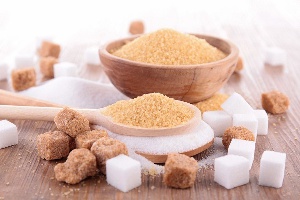Many of us bin don make new year resolution say we go start to dey chop healthy foods, but sometimes we no dey fit keep to dis resolutions sake of strong craving for sweet tins, salty foods or food wey get plenti carbohydrate.
Why e be say na wen we don decide to improve our diet or lose weight na dat time we dey always dey anxious of foods like dis? And wetin we go fit do about am?
E get plenti reasons why we dey crave some kind foods dem, but make we focus on di four wey dey common pass:
1. Drop in blood sugar
Sugar na one ogbonge source of energy for all animals and im taste na one of di most basic sensory experiences.
Even though di tongue no get any specific sweet taste receptors, pesin fit still develop strong preference for sugar, and dis show say e no be just becos of di sweet taste.
Neurons wey dey respond to sugar dey activate wen e reach di intestine, and dis fit increase your appetite and make you want to eat more and more.
Also, as you dey succumb to sugar cravings e dey cause more appetite for more sugar.
For di long term, research don suggests say diet wey high in sugar fit affect mood, digestion, and intestinal inflammation.
To dey always chop food wey get plenti sugar or carbohydrate fit cause drastic rise and rapid falls for blood sugar levels, although e no be di same for evribodi.
Wen your blood sugar drop, your bodi fit respond by craving a quick source of energy, often in di form of sugar and carbohydrates, becos na im dey offer di quickest and most easily accessible form of energy.
2. Decreases in dopamine and serotonin
Some neurotransmitters, like dopamine, dey involved for di reward and pleasure centers of di brain.
Foods wey get plenti sugar or carbohydrate fit trigger di release of dopamine, wey go create pleasurable experience and make you to dey always crave for dem.
Serotonin, di feel-good hormone, dey suppress appetite. Natural changes in serotonin fit influence daily fluctuations in mood, energy levels, and attention.
E also dey associated wit eating more carbohydrate foods for afternoon.
Low-carb diets dey reduce serotonin and lower your mood. However, one recent systematic review show say dis diets no too get connection wit di risk of anxiety and depression.
Women dey crave for sugary or carbohydrate-rich foods pass men.
Feeling irritable, tired, depressed, or craving carbohydrates na part of premenstrual symptoms and e fit dey related to reduced serotonin levels.
3. Loss of fluids and drop in blood sugar and salt
Sometimes our bodi dey crave wetin e lack, like water or even salt. For instance, diet wey no get carbs fit reduce di level of insulin, sodium and water retention.
Veri low-carbohydrate diets, such as ketogenic diets, dey cause “ketosis,” a metabolic state in which di body go begin dey use fat as im primary source of energy.
Ketosis dey often cause increased urine production, wey dey further contribute to possible fluid loss, electrolyte imbalances, and craving for salt.
4. High levels of stress or emotional disturbance
Stress, boredom, and emotional disturbance fit make pesin to dey crave for comfort foods.
Dis na sake of say stress-related hormones fit affect our appetite and food preferences.
Di stress hormone cortisol, in particular, fit lead to craving for sweet foods.
One study for 2001 monitor 59 women wey dey premenopause and who don dey subjected to stress. Di study reveal say stress cause dem to consume more calories.
Anoda recent study find out say chronic stress, wen combined wit a high-calorie diet, dey increase food intake and craving for sweet food.
Dis show say e dey important to dey maintain healthy diet during stress to prevent weight gain.
Wetin you fit do about sugar and carb craving?
Dis na four tips wey you fit apply to reduce sugar cravings:
1. No eliminate entire food groups. Try to dey eat balanced diet and make sure say you dey include enough protein for your food to help you feel belefull and reduce di urge to eat food wey get plenti sugar and carbohydrate.
Pipo wey don old suppose dey eat between 20 and 40 g of protein per meal, focusing especially on breakfast and lunch. Food wey dey rich in fibre, such as vegetables and whole grains go make you feel full and stabilise your blood sugar levels.
Oda examples na broccoli, quinoa, brown rice, oats, beans, lentils, and bran cereals.
You fit also replace high-sugar refined carbohydrates foods such as cookies, sodas, or baked goods, wit ones wey dey more complex, like whole-grain bread or whole-grain muffins, or nut and seed bars or oats.
2. Manage your stress levels. Practice stress reduction techniques like meditation, deep breathing, or yoga to control emotional triggers for food cravings.
As you dey practice mindful eating, eating slowly and tuning into body sensations, e fit reduce daily calorie intake and reduce cravings.
3. Get enough sleep. Try to dey get quality sleep reach seven to eight hours for night. Lack of sleep fit disrupt di hormones wey dey regulate hunger and cravings.
4. Control your portions. If you wan indulge, den e go beta to monitor how much you dey eat, make you no go overdo am.
As you don decide to dey eat healthy, to overcome cravings for sugar, salt, and carbohydrates go get huge challenge, but remember say na journey and setbacks fit happun.
Dey patient wit yourself: occasional cravings no be wetin go decide your success, na your ability to manage and overcome dem.
Hayley O'Neill na assistant professor for di Faculty of Health Sciences and Medicine for Bond University.
Dis article don first appear for The Conversation. You fit read di original version for English here.
- Table salt, Himalayan and odas - E get any beta type of salt wey good for your health?
- Meet ogbonge Nigerian baker wey her large art cakes dey burst pipo brain
- Di health benefits of coconut
















